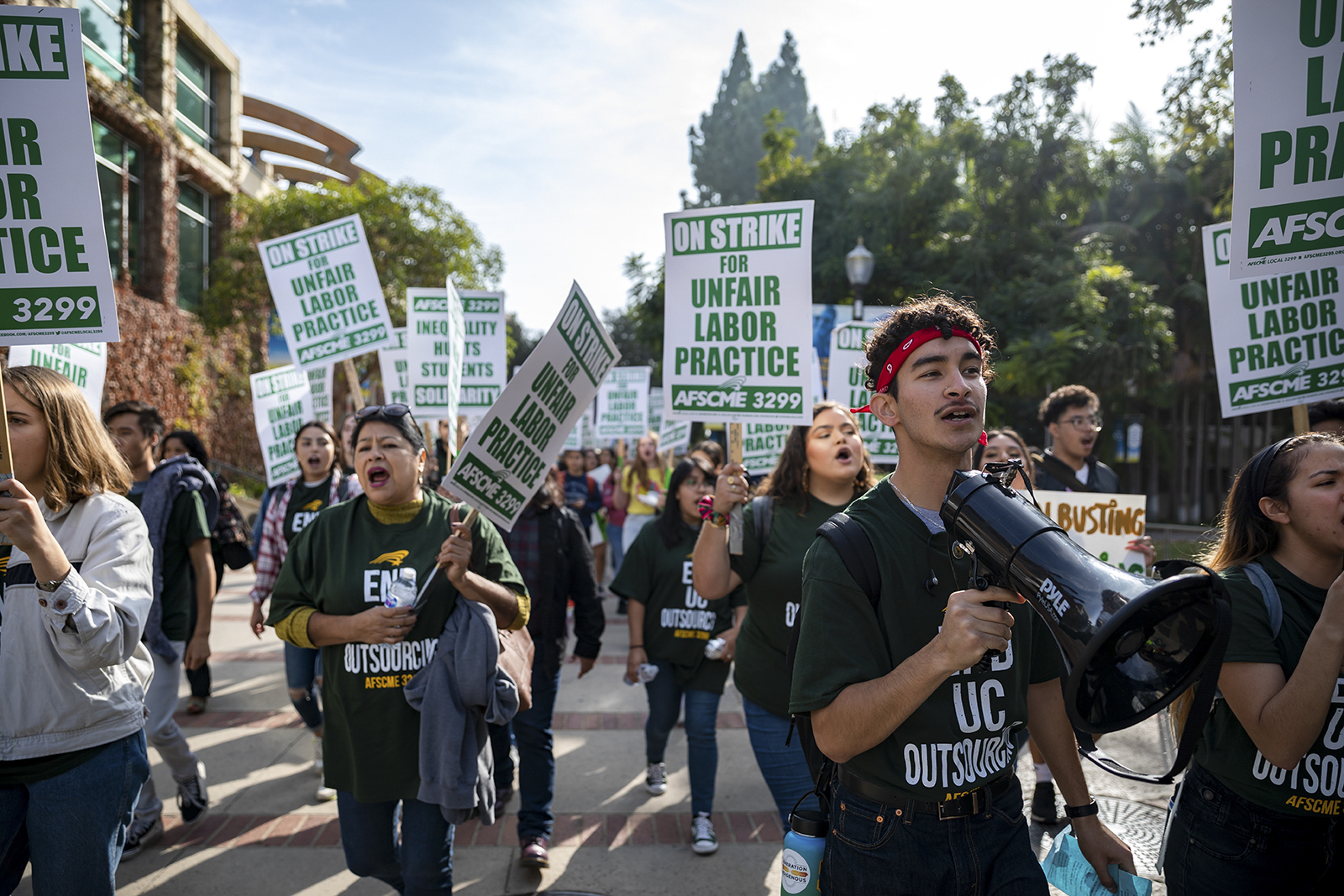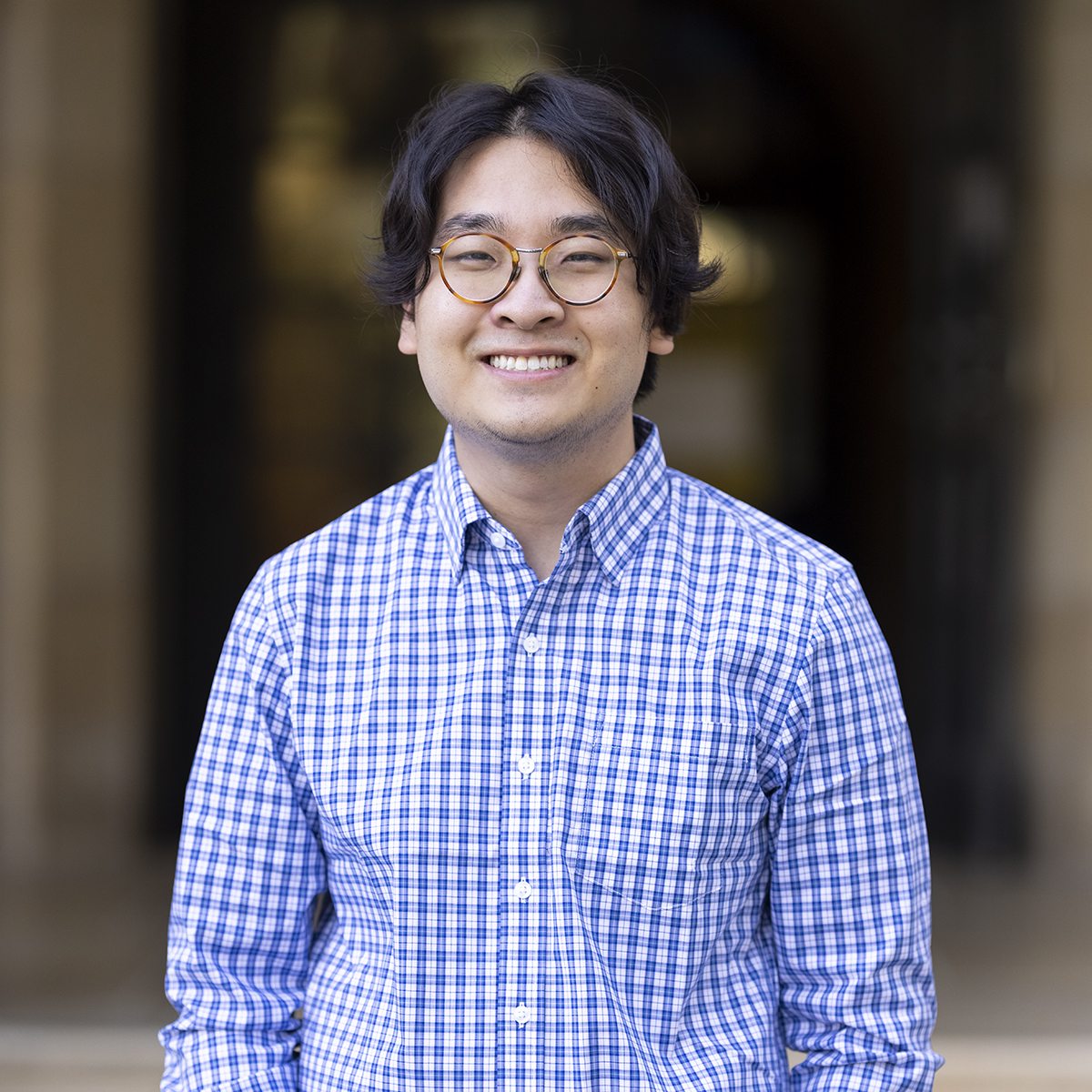AFSCME strikes for 6th time in 2 years after new labor charges filed against the UC

Hundreds of workers from American Federation of State, County and Municipal Employees Local 3299 and students in support of the union, marched throughout campus Wednesday over the University of California’s alleged practice of outsourcing. (Tanmay Shankar/Assistant Photo editor)

By Justin Jung
Nov. 13, 2019 9:26 p.m.
This post was updated Nov. 14 at 12:43 a.m.
A University of California employee union went on a statewide strike Wednesday protesting the University’s outsourcing practices.
American Federation of State, County and Municipal Employees Local 3299 is a UC employee union representing over 25,000 service and patient care employees. The union announced the strike Nov. 1 after filing six Unfair Labor Practice charges against the UC, claiming the UC breached state and University rules related to contracting.
“Two weeks ago, AFSCME filed six Unfair Labor Practice charges against the University, alleging both violations of state law and long standing University policy, in connection with UC’s secretive and expanding outsourcing policy,” said AFSCME spokesperson Todd Stenhouse. “This strike is about six specific violations. It’s a pattern we’ve seen over years.”
The employee union previously went on strike in April over alleged intimidation of union members who participated in earlier strikes. In the past two years of ongoing negotiations, the union has gone on strike six times.
One of the six ULP charges resulted in the filing of an official complaint against the UC by the Public Employment Relations Board, which regulates bargaining statutes.
John de Los Angeles, another AFSCME spokesperson, said one contract outsourced jobs at UCLA to AMN Healthcare. He said the contract has been amended 28 times since 2009. The agreement originally contracted out two job titles, but now contracts out 19.
“The reason why that’s shocking is that they’re circumventing the competitive bidding processes, and they’re also breaking state law by not meeting and conferring with the workers who are affected,” de Los Angeles said.
The Wednesday strike at UCLA began at 8 a.m. at the Ronald Reagan UCLA Medical Center. Thousands of workers were expected to participate statewide, with some at the picket lines and others not reporting for work. Hundreds of workers and students marched in support of the union at UCLA as well.
“A one-day strike for a worker who makes $45,000 in California is an incredible sacrifice,” Stenhouse said.
Lex Von Klark, a first-year political science student, said he was happy to see workers and students striking. Von Klark added when the workers are not happy, neither are the students.
“Students have to understand that as much as we rely on the University, the University also relies on us,” Von Klark said. “So when workers go on strike, or even when students go on strike, we have a lot of power to change things.”
Alexia Hatun, a member of the Student Labor Advocacy Project of UCLA, said workers are a crucial part of the campus community, and students feel deeply connected with the workers.
“Workers’ working conditions are students’ learning conditions and vice versa,” said Hatun, a fourth-year history student. “So we know that when workers are being exploited, that really negatively impacts the entire campus and negatively impacts our communities because workers are part of our campus community.”
UC Office of the President spokesperson Andrew Gordon said in an email statement the strike was an attempt to gain leverage in the ongoing negotiations.
Gordon said the University had already offered 12 proposals to AFSCME during the bargaining process. He said the latest wage proposal was a guaranteed 3 to 3.5% raise per year, as well as the same health insurance and pension plans as other University employees.
However, de Los Angeles said the union was not striking to bargain for better wages or union growth.
“What good is (wages or union growth), if they’re allowed to outsource these jobs tomorrow?” de Los Angeles said. “This is about job security. This is about real people living their everyday lives, just making sure that they can get by and provide for their family.”
Gordon denied the AFSCME claim that employees have been displaced because of contracting, adding that the number of service and patient care workers have actually grown. Gordon said over the last five years, the number of service workers has increased by 16.8% and the number of patient workers by 27.9%.
However, AFSCME member Clarity Lemieux said UC outsourcing has increased over the past two years.
“It’s been going on for about two years, but it’s gotten worse over time,” Lemieux said. “Our contract is currently expired and there is no language in our previous contract about outsourcing. They continue to do so, and the worst part is that they aren’t notifying us so we can’t replace the empty positions with full-time employees before they fill them with agency contractors.”
The University’s failure to notify affected employees when contractors were hired was one of the reasons the union filed the ULP charges, Lemieux said.
The ULP charges were based on the results of a 2017 California state audit that identified problems in outsourcing. The audit found that out of the 31 contracts that were reviewed, two contracts had outsourced University employee work. These two contracts were from UC San Francisco and UC Davis.
In both cases, the UC was found to have failed displacement guidelines. According to the audit report, UCOP does not have a systemwide database of basic contract data at all UC campuses. Moreover, UCLA was unable to report basic data on the way in which service providers were selected.
In response, UCOP signed a contract with a software company to create a centralized database for contracts in May 2017. The UC and California State University began using a new online platform in January 2018 to track contract data. The platform, called CalUsource, is used for a number of purposes, including contract management.
In acknowledgment of the union’s continued protests against the UC, the Democratic National Committee moved the location of the sixth Democratic presidential primary debate from UCLA to Loyola Marymount University. The debate was originally planned to be held in Royce Hall at UCLA on Dec. 19.


